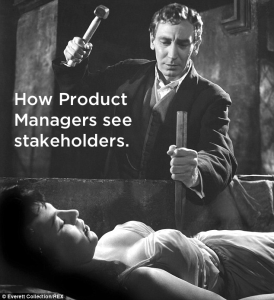How to Educate Stakeholders
There is one question I always get during every Product Management workshop:
How do I convince/teach/educate stakeholders to work this way?
The class has bought in on validation before building, a focus on problems, and defined metrics. They can see the value, but they are afraid they will return to work and get shot down. Often they do. Unfortunately, there's really not much you can do about it as a Product Manager. Your job is not to educate and train your entire company on this way of working. It's to create valuable products for your customers and your business.
The way I approach stakeholders is the same way I approach customers - empathize. Stakeholders aren't at this company to make your life miserable. They are there to do a job. So start to ask questions and learn about them. How are your stakeholders measured for success? Usually they have concrete goals they have to hit. Learn what those are. What are your stakeholders problems? How can you solve them?
When you start empathizing with stakeholders, you realize that the things they are demanding or requesting relate back to assumptions. These assumptions are based on what they think will help them solve their problems. Become a Product Manager for your stakeholder. Explain how this way of working helps them achieve their goals. This has worked very well for me in the past, even with really difficult stakeholders.
Now, if you stakeholder still doesn't understand this way of thinking and is not bought in, you need to change your approach. If you are having meetings where you are asking for feature requests, stop. Stop it right now. The meetings you set with Stakeholders and the way you run those meetings set the tone for your relationship. If the purpose of all your meetings are to gather requirements (aka feature requests) and communicate deadlines, this is the way your Stakeholders will view you - as a place to dump their requests and get status updates.
Flip those meetings on their heads. Use them to learn more about their business and the problems they are currently trying to solve. Give status updates on what you are currently learning and the goals you're working towards, not hard dates on shipments. Changing the conversation allows your team to come up with the best solutions, instead of building just what the stakeholders or customers ask for.
Remember, you're job is not to teach or educate. You need to explain clearly why you do certain things, but that explanation is enough. Start to draw the line. Work with your manager on approaches and tactics so you have support from above.
Have you tried all this and it's still not working? I'm sorry. That happens a lot. Honestly, until stakeholders, managers, and team leaders want to change, they won't. You can encourage them to start coming to the same conferences and workshops you do. That will help build a shared context. Many of my workshop attendees leave and say "I wish my manager was here for that." If you are a manager, I would take that sentence to heart. You're never too busy to spend time educating and improving yourself. But, if none of this works, you have to make a tough call.
Last night I was talking to James Royal-Lawson who put it the best way I've heard yet. When someone asks how to convince their managers or stakeholders, he replies:
What do you want to do with your career? Do you want to go into training and change management? Or do you want to be awesome at your job? If you don't want to go into change management, find a job that allows you to be the best you can be. If you want to do change management, then we'll talk.
If you want to change a company, that's going to be where you spend all of your time. This is what I do every single day. You have to be ready for it. It's a long hard role. If you want to be the best Product Manager, then try some of the above, or find a place that will let you grow.
